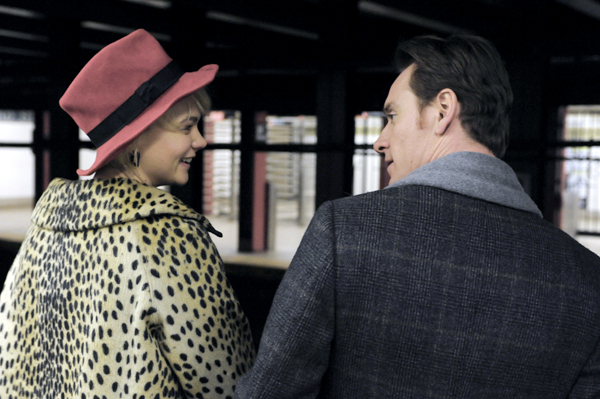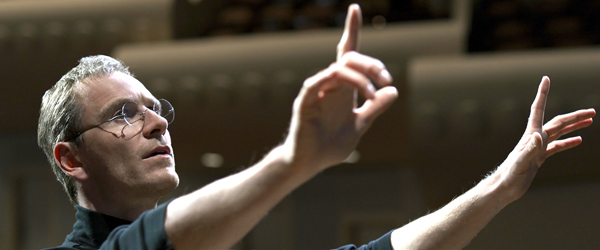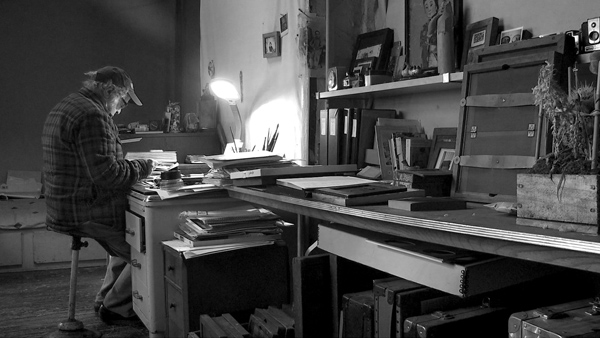
Carey Mulligan and Michael Fassbender in SHAME (Abbot Genser/Fox Searchlight)
Directed by Steve McQueen
Produced by Iain Canning & Emile Sherman
Written by Steve McQueen & Abi Morgan
Released by Fox Searchlight
UK. 99 min. Rated NC-17
With Michael Fassbender, Carey Mulligan, James Badge Dale & Nicole Beharie
Earnestly somber, Shame arrives with a lot of baggage, namely an envelope-pushing amount of sex and nudity. (The NC-17-rated film arouses the type of controversy that Miramax, back in the late 1980s, would have had a field day with its marketing campaigns, like for Tie Me Up! Tie Me Down! and The Cook, the Thief, His Wife, and Her Lover.) The focus by the press on the sexual content is unavoidable—there’s plenty of it. The film opens with something of a crotch shot of actor Michael Fassbender walking nude past the camera, which is set at waist level. In an interview at the Toronto Film Festival, McQueen disingenuously shrugged off the attention on the full-frontal nudity: “Half the people in the audience have what [Fassbender] has, and 99% percent of the audience has seen what he has.”
The hype is hot, but the film’s tone is steadfastly funereal, from the first plaintive musical chords to the icy blue production design. At times, McQueen’s approach is not unlike a nature documentary, with the camera steadily trained on its prey. Both the script and the editing are methodical and clinical, in complete opposition to the actions of 30-something mid-level executive Brandon Sullivan (Fassbender), who has very little impulse control.
To say Brandon is a sex addict would be too easy. The script skimps on his background and focuses on action, pun intended. Shame is yet another example of invasive filmmaking: the camera accompanies Brandon everywhere. What separates Brandon from, say, Michael Caine’s Alfie is his easy access to sex, virtual or otherwise. He calls up prostitutes (money’s no issue) or returns to the porn sites as soon as he comes home from work (even his office computer’s hard drive is littered with viruses from XXX sites). Sex here is the uncontrollable other, an all-encroaching dark force. (Brandon, say hello to the alcoholics of Days of Wine and Roses and The Lost Weekend.)
He’s all into the visual. With one prostitute, very few words are exchanged before he lies back in bed and watches her strip off her clothes while he appraises her body. Later, with he goes at it with another hooker as if they are in their own porno video. Instead of performing for a camera, they’re on display for the rest of the world to see, if the passersby on the street would just look up into his hotel room to see them standing naked at the floor-to-ceiling window. (It was filmed at the Standard Hotel in Manhattan’s Meatpacking District, which immediately gained a reputation after its opening in 2009 as a bonanza for voyeurs.) Set in New York City, not a ray of sunshine pierces the overcast skies. The film burrows indoors or on the subway in the movieland Manhattan of high-rise, one-bedroom apartments with impressive views, and where executives stay out at all hours partying midweek. The tenor of the times is more late-1990s bull market than post-recession belt tightening, even though it’s set in the here and now.
Good looking and ultra-fit, Brandon carries a quiet confidence; he doesn’t have to work hard to score or master the art of conversation. This is painfully evident the only time he’s out on a date. He doesn’t know how to talk to Marianne (Nicole Beharie), a work colleague, or to read her reactions. But say what you will, he’s honest and a voice of reason, to an extent. He lays out all of his cards, confessing he doesn’t understand why people still marry—one person for the rest of your life? Not realistic. Yet he never has to dissemble to get what he wants, and no one mistakes the intention behind his x-ray, blue-eyed stare. Funnily enough, the film’s most intimate and voyeuristic scene occurs during a follow-up date, when Brandon and Marianne play hooky from work. The scene’s not graphic at all. It’s chaste in comparison to the rest of the film, but unlike earlier encounters, we actually have gotten to know Marianne, and so has Brandon—and why this encounter ends differently than his other trysts.
The unexpected arrival of his sister Sissy (Carey Mulligan) breaks his almost robotic ritual of sex and sex and more sex—he’s like an automaton with a hard-on. Their relationship is the most compelling and puzzling sibling relationship recently seen on screen, ripe for any interpretation. She’s a deus ex machina and a needy mess. And as such, she knows which button to push. She has breezed into town for a nightclub engagement, where her rendition of “New York, New York” turns the anthem into a dirge. Sung mostly in a claustrophobic close-up, the lyrics’ boasting of determination and renewal provides the most explicit exposition in the entire film.
Decked out in vintage clothing and with her bobbed bleached-blond hair contrasting with her dark eyebrows, Sissy looks so much like Edie Sedgwick—and she might follow the Warhol superstar’s same fate, based on the telltale wounds on her wrists. Together with Mulligan’s performance and Michelle Williams’ take on Marilyn Monroe in My Week with Marilyn, the damaged blonde returns this year with a vengeance. Shame provides as much of a career-defining role for Mulligan as it does for Fassbender.
But when it comes to sex, McQueen has it both ways. On one level, the film has a whiff of the neo-puritanical. Not only is Brandon a sex machine, but he has contempt for himself, but ironically very little shame. One night on a bender, he hits on a woman in a very direct and leaving-nothing-to the-imagination manner, and repeats his come-ons in front of her boyfriend. He seeks punishment, and the pummeling that follows delivers it. He then staggers to a nightclub, where the bouncer takes one look at his bruised face and turns him away. With nowhere else to go but down (so to speak), Brandon ventures into the gay sex club around the corner, a hold-over from William Friedkin’s 1981 Cruising, where anonymous sex lurks everywhere within its dark mazes.
At the same time, there’s no epiphany revealed to Brandon, and if it did, it wouldn’t likely be in the form of a monogamous relationship. Yet after 90 minutes, the viewer only knows Brandon superficially. Of his family’s past, all we know is based on Sissy’s observation that “We’re not bad people. We just come from a bad place.” What might turn off viewers is not the sexual content but Brandon’s lack of self-perception, and the terse script, playing hard to get, also keeps us at a distance. Shame shows a lot and very little. Abi Morgan’s screenplay performs a bit of a strip tease, slowly revealing a little bit here and a little bit there, while frustratingly maintaining too much mystery.






Leave A Comment